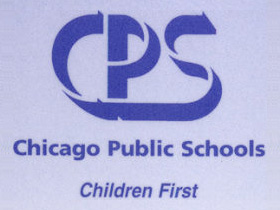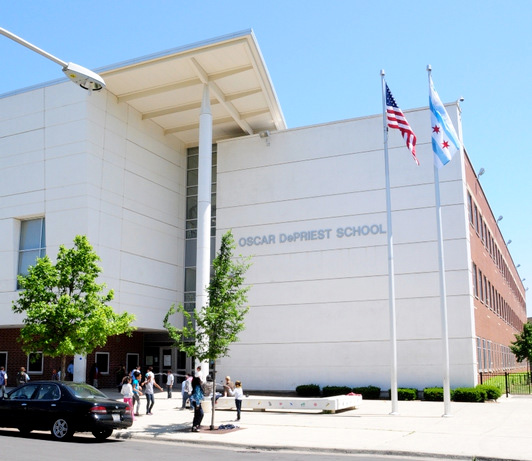| « How an Overlooked Rauner Job Creation Plan Caused Problems Across America | Jane Byrne, the Bold Mayor » |
Chicago Public Schools Wed Nov 12 2014
Cuts to Social Safety Net, School Resources Leave CPS Bleeding Students
 Chicago Public School enrollment dropped by around 3,000 this year, contributing to a total loss of 6,000 students in the district since 2012. For the first time since 1970, CPS enrollment has fallen below 400,000.
Chicago Public School enrollment dropped by around 3,000 this year, contributing to a total loss of 6,000 students in the district since 2012. For the first time since 1970, CPS enrollment has fallen below 400,000.
This loss of students stems from failures by the Emanuel and Daley administrations that go beyond education policy alone. Both our current and previous mayors have focused resources downtown and in wealthy business districts. This has come at the direct expense of low-income families living in neighborhoods City Hall consistently neglects. As housing costs have soared, the social safety net shriveled, and neighborhood schools have been closed or consistently cut back, many low-income families have chosen to move out of the city.
"I knew my daughter couldn't get the quality education that she deserved in our neighborhood schools," explained Zerlina Smith, a single mother living in the West Side community of Austin. When it came time to send her daughter Cherish to pre-K, Smith was alarmed at the lack of resources at her neighborhood public school, Oscar DePriest, which at the time was on the list of schools set to be shuttered by the Emanuel administration. But Smith was not ready to give up on CPS completely. "I chose to send her 16 miles away from our home to Maria Saucedo, which is a scholastic academy and a level one school with an abundance of resources."
Sending Cherish to a school so far away has placed an extreme burden on their small family, Smith said. "[Since] I decided that I wanted my daughter to go to a school that wasn't in walking distance from our house, I had to decide if I would pay lights or gas, or put clothes on my daughter or gas in the vehicle, or bus fare to get her to school on a daily basis. Economics-wise, it might not be a great choice, but education-wise for a 5-year-old, now in today's society, it was the best choice." While she feels it is worth it to give her daughter the best available public education, she is not sure if she will continue to be able to make ends meet living in the city.
The adversity that Smith faces is far from unique. Smith owns her home and has chosen to remain in Chicago for the time being. But when faced with no viable neighborhood schools and a paucity of affordable housing, many have decided the city was no longer viable. This was reflected in the 2010 Census, which recorded a loss of over 200,000 Chicago residents, most of whom were black and many who resided in low-income neighborhoods on the South and West sides.
This migration out of the city -- which is a direct result of city policy rather than a benign coincidence -- is in large part responsible for the loss of students. "The Emanuel administration has a more aggressive policy of ethnic cleansing and urban removal of poor people of color than virtually any administration in the history of Chicago," argued Jackson Potter from the Chicago Teachers Union.
Toward the beginning of the 20th century, Chicago became home to many black Southerners who were seeking a better life in the North as part of the Great Migration. Now, it seems that many of these families have finally given up on a city that continues to distribute resources along lines of race and income.
In 2012, 85 percent of CPS students were low income. Yet the percentage of low-income families with school-age children living in Chicago is much lower, at 52 percent. Only 9 percent of CPS students are white. Forty-one percent of CPS schools are 90 percent or more black, and over two-thirds of the city's black students attend those schools. Chicago's public schools are desegregated in name only, and it is mostly low-income families of color who are impacted when they cannot depend on their neighborhood schools.
"What is happening is you're emptying out low-income families that are struggling by removing the very little support they had previously, in terms of subsidized housing and easily accessible neighborhood schools," explained Potter. "Once you dismantle those fundamental institutions that are required for even a basic, decent standard of life, you have pulled the rug out from under people's lives, and they have no choice but to flee and try and find refuge elsewhere."

Oscar DePriest Elementary School; photo courtesy of the school.
In conjunction with population loss, the Emanuel administration's unpopular decision to close 50 public schools in 2012 cannot be ignored when examining these numbers. As their neighborhood schools disappeared, many families were left vying for positions in charter schools or forced to leave the district altogether.
A third factor contributing to the loss of students has been the funneling of public resources away from traditional public schools and into privately run charter schools. Since closing 50 schools due to the so-called lack of students, the district has opened over 140 new schools, the vast majority of which are privately run charters.
"Truthfully, I think that a big part of [the problem] is that money and resources have been stripped from neighborhood public schools that need it, and put into the charter schools, who are often connected to downtown through pay for play," opined Ian Randolph, a high school Spanish teacher at Morgan Park Academy. "Basically, they're giving campaign money and then getting money back." This year, there are a projected 339,463 in traditional public schools, with an additional 60,992 students in charter schools.
There is no evidence that charter schools perform any better than public schools, and there have been serious issues around the discipline policies used by charters, which include fining students for minor offenses.
One clear step the city can take to improve the quality of public schools is to instate an elected school board. Another is to re-channel funding that has been given to charter schools back into neighborhood schools. But education policy is not enough on its own. "What needs to occur is a unified approach that allows for massive investment into low-income communities in the form of affordable housing, rent controls, public housing and drastic increase in per pupil expenditures in public schools to fortify and strengthen our neighborhood schools," Potter argued. Chicago needs an administration that cares about all the city's residents, and distributes resources accordingly.
Zerlina Smith put it simply. "If the mayor's kids went to Oscar DePriest, where my daughter attended, you can be quite sure that they would have had a fully funded and equipped science lab, a fully funded art and music program, and an abundance of after school resources." Emanuel sends his children to University of Chicago Lab School, an elite private school. There is nothing wrong with a parent wanting the best education for his children. But all parents, even those who are not politicians or investment bankers, should be able to fulfill this same desire for their children. Those who need the most from their education should not continue to suffer through the least.











